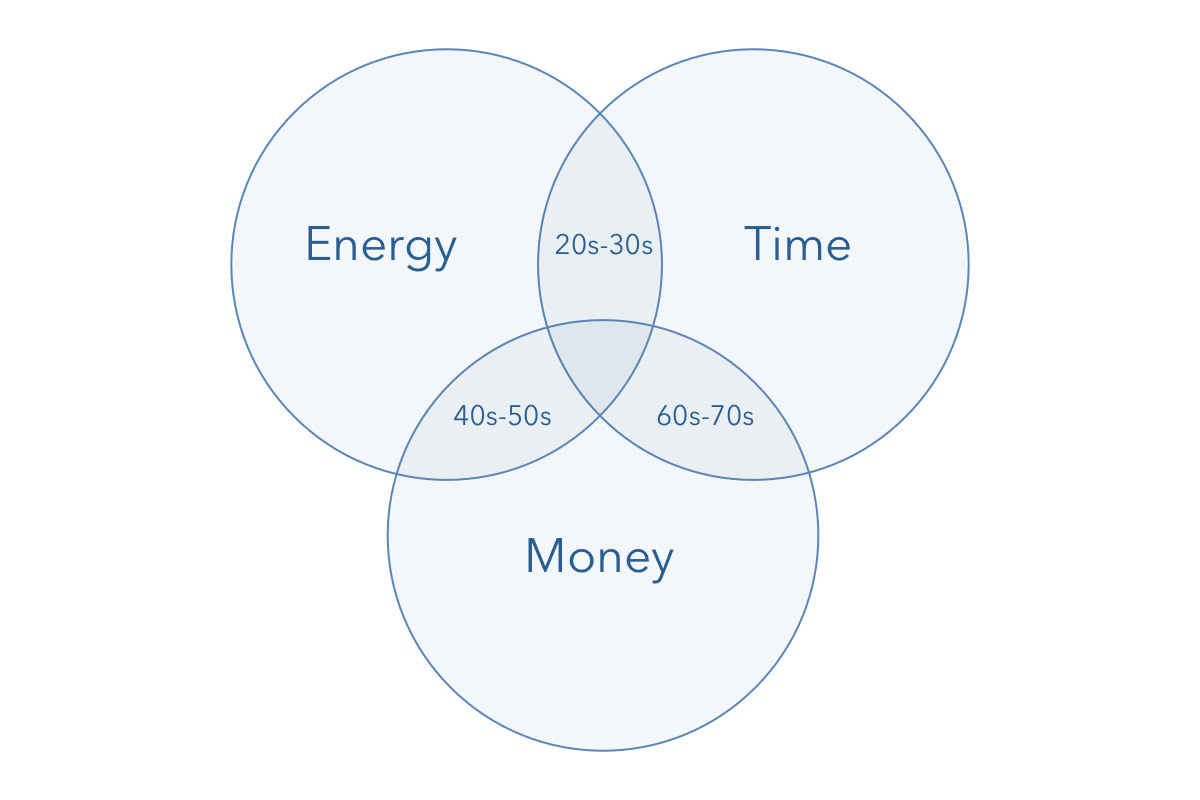There are three things you need in order to do anything, whether it’s productive work or having fun: time, energy, and money. If you have all the time, energy, and money in the world, you’re unstoppable. You can do anything you want.
If you’re reading this, you’re probably lacking at least one of those three. (I’m writing it, and I know I am.)
Which one we’re lacking varies from day to day and sometimes over the course of a day. Thinking in broad strokes, each one of them takes a turn being generally scarce as we go through life. Thinking in really broad strokes, they line up with the second, third, and fourth vicennia of life.

In your 20s and 30s, you have plenty of time and energy, but no money.
This is a time to learn everything you can. Explore. Discover. Find out what you’re passionate about and make sure your career is pointing in the right direction. Spend time with friends. There are plenty of memories and bonds you can forge on the cheap.
With time and energy on your side, start building habits that will serve you throughout your life.
First, learn to live on a budget and invest for retirement when the numbers (and the mistakes) are small. You’ll be tempted to compensate for the lack of money coming by spending money you don’t have. Don’t let debt rob you of the next 10–20 years of your life.
Second, learn how to exercise and eat right. Get plenty of sleep. If you can integrate good exercise, diet, and sleep habits into your routine now, it’ll be easier to maintain when things get busy in the next stage.
Two out of three ain’t bad.
Jim Steinman
In your 40s and 50s, you have plenty of energy and money, but no time.
Your career is taking off. Your wallet can breathe a little easier, but don’t think you can get by without a budget for your money. You don’t want to let mistakes (now with an extra zero or two) undo the solid foundation you’ve built.
If you haven’t thought of planning as creating a budget for your time, now is a good time to start. The lack of time in your life is going to cause tension between your roles. Spend a few minutes each week to plan how you’re going to spend the next 168 hours. You won’t be able to do everything you want, but you can still do the best things.
Make sure your budget for your time includes keeping up the good habits of exercise, diet, and sleep you developed in stage 1. They’re a huge investment in your future.
Be kind to your knees. You’ll miss them when they’re gone.
When you reach your 60s and 70s, if you’ve played your cards right, you’ll have plenty of time because you have plenty of money. The question is whether you’ll have enough energy.
Budgeting your energy is like budgeting your time, but with a whole new twist. The things you’re going to spend your time on? Those take energy. Those healthy habits of exercise, diet, and sleep you’ve integrated into your lifestyle over the last four or five decades? They replenish your energy. They renew you. They restore your potential to do meaningful work.
The earlier you start investing and building wealth, the more solid your financial situation will be in stage 3. At a time in your life when you’re already low on energy, you don’t want to have to budget the majority of your energy to generating an income. You’re not going to have anything left to enjoy life with.
Stop and think for a minute about that interdependency between time, money, and energy in stage 3.
Is it ever too early to start budgeting your money?
Is time ever a plenteous resource?
Do you ever really have enough energy to waste in Quadrants 3 and 4?
Is waiting for a different stage in life to solve all your problems going to work? Or are you going to get to work and make something happen with the time, energy, and money you’ve got?
All three are resources to be managed. All three are appropriately budgeted at all stages of your life. All three are going to be a precious commodity at times. If properly managed, all three will take their turn in abundance.
With a little bit of luck, they’ll be abundant at the same time.
Question: What can you do to compensate for the time, energy, or money that’s missing right now? Share your thoughts in the comments, on Twitter, LinkedIn, or Facebook.

